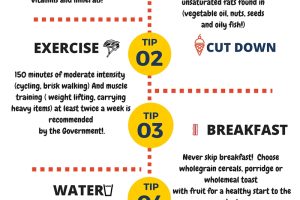Fuel Your Body Right: Tips for a Healthy Lifestyle

Importance of a Healthy Lifestyle
Leading a healthy lifestyle is crucial for achieving long-term wellness and vitality. It’s not just about looking good; it’s about feeling good and being able to engage fully in life. Adopting healthy habits can:
- Fuel Your Body Right: Tips for a Healthy Lifestyle
- Importance of a Healthy Lifestyle
- How Nutrition Affects Overall Health
- Balanced Diet Basics
- Understanding Macronutrients
- Importance of Micronutrients
- Meal Planning Tips
- Creating Balanced Meals
- Healthy Snack Ideas
- Hydration and Its Role
- Benefits of Staying Hydrated
- How Much Water You Should Drink
- Importance of Regular Exercise
- Different Types of Exercise
- Creating an Exercise Routine
- Quality Sleep for Health
- How Sleep Impacts Overall Wellbeing
- Tips for Better Sleep Hygiene
- Stress Management Techniques
- Effects of Stress on the Body
- Coping Strategies for Stress
- Building Healthy Habits
- Setting Realistic Goals
- Ways to Stay Consistent
- Mindful Eating Practices
- Benefits of Mindful Eating
- How to Practice Mindful Eating
- Social Support for a Healthy Lifestyle
- Importance of a Support System
- Building Healthy Relationships
- Self-Care and Wellness Practices
- Prioritizing Self-Care
- Incorporating Wellness Activities
- XII. Tracking Progress and Adjusting Goals
- Tools for Tracking Health Goals
- Adjusting Goals for Long-Term Success
- XIII. Seeking Professional Help
- When to Consult a Nutritionist or Dietitian
- Importance of Regular Health Check-Ups
- XIV. Overcoming Challenges and Staying Motivated
- Common Obstacles to a Healthy Lifestyle
- Strategies for Maintaining Motivation
- XV. Conclusion
- Final Thoughts on Fueling Your Body Right
- Taking the First Steps towards a Healthier Lifestyle
- Boost energy levels
- Improve mood
- Enhance mental clarity
- Reduce the risk of chronic diseases
For instance, after making small changes like incorporating daily walks and cooking at home, many individuals notice significant improvements in their daily lives, showcasing that every little adjustment counts.
How Nutrition Affects Overall Health
Nutrition forms the foundation of our health. The foods we consume provide the essential nutrients our bodies need to function properly. A well-balanced diet can:
- Strengthen the immune system
- Promote healthy digestion
- Enhance skin and hair health
Consider someone who switches from fast food to a diet rich in whole foods, fruits, and vegetables. Not only do they feel more energetic, but they also notice improvements in their skin and overall mood. Nutrition isn’t just about counting calories—it’s about nourishing the body for a vibrant life.
Balanced Diet Basics
Understanding Macronutrients
To build a balanced diet, it’s essential to understand macronutrients, which are the nutrients our bodies need in larger quantities. These include carbohydrates, proteins, and fats. Each plays a vital role:
- Carbohydrates: The body’s primary energy source, found in foods like whole grains and fruits.
- Proteins: Critical for muscle repair and growth, sourced from meats, legumes, and dairy.
- Fats: Necessary for hormone production and nutrient absorption, best obtained from sources like avocados and nuts.
Consider someone training for a marathon; they must balance these macronutrients to fuel their body effectively.
Importance of Micronutrients
While macronutrients are crucial, don’t overlook micronutrients—vitamins and minerals needed in smaller amounts yet are indispensably vital for overall health. They support various bodily functions:
- Vitamins: Such as Vitamin C for immune function and Vitamin D for bone health.
- Minerals: Like iron for blood health and calcium for strong bones.
Imagine a person enjoying a colorful salad packed with various veggies. They’re not just making a meal look appealing; they’re giving their body a range of micronutrients that could prevent deficiencies, enhance energy levels, and promote overall health. Balancing both macro and micronutrients ensures your body functions at its best.
Meal Planning Tips
Creating Balanced Meals
Now that you understand macronutrients and micronutrients, let’s dive into meal planning. Creating balanced meals is about incorporating a variety of food groups. A classic formula to follow is:
- Half the plate: Vegetables and fruits
- One quarter: Lean proteins (like chicken, fish, or legumes)
- One quarter: Whole grains (such as brown rice or quinoa)
For instance, preparing a colorful stir-fry with mixed vegetables, grilled chicken, and brown rice not only ensures a balanced meal but also keeps it exciting.
Healthy Snack Ideas
Snacking can be beneficial when done right. Opt for snacks that incorporate both macronutrients and micronutrients:
- Greek yogurt with berries: A great source of protein and antioxidants.
- Hummus with vegetables: Offers healthy fats and fiber.
- Nuts and an apple: Provides a potent combination of healthy fats and quick carbohydrates.
A personal favorite? Making homemade energy balls with oats, nut butter, and a hint of honey. They are nutritious, portable, and perfect for a midday energy boost. With a little planning, you can turn healthy eating into a fun and delicious adventure!
Hydration and Its Role
Benefits of Staying Hydrated
With balanced meals and healthy snacks in your routine, it’s important not to overlook hydration. Staying hydrated plays a crucial role in maintaining overall health. Here are some benefits of drinking enough water:
- Improved digestion: Water helps break down food for better nutrient absorption.
- Enhanced energy levels: Mild dehydration can lead to fatigue, while staying hydrated keeps energy up.
- Clearer skin: Proper hydration can promote a healthier complexion.
For instance, after incorporating more water into her day, a friend noticed how her skin looked much more radiant, and her energy levels soared during workouts.
How Much Water You Should Drink
But how much water should you actually be consuming? While individual needs vary, a good general rule is to aim for:
- Eight 8-ounce glasses per day (the “8×8 rule”)
- Adjustments based on activity level, climate, and diet (especially if consuming salty or caffeinated foods)
A personal tip is to carry a reusable water bottle and set reminders throughout the day. Just by making hydration a priority, you can significantly enhance your vitality and well-being.
Importance of Regular Exercise
Different Types of Exercise
Just as hydration plays a vital role in health, regular exercise is equally essential for a balanced lifestyle. Engaging in various types of exercise keeps things interesting and offers unique benefits. Consider these categories:
- Aerobic Exercise: Activities like running, cycling, or swimming that improve cardiovascular health and burn calories.
- Strength Training: Using weights or resistance bands to build muscle and enhance metabolism.
- Flexibility and Balance: Incorporating yoga or stretching routines supports joint health and prevents injuries.
For example, mixing these types can keep workouts fresh and fun, like a weekend hike followed by a strength session during the week.
Creating an Exercise Routine
To reap the full benefits, creating a consistent exercise routine is key. Aim to include:
- 150 minutes of moderate-intensity aerobic activity per week
- Two days of strength training focusing on major muscle groups
A personal strategy is to schedule workouts like appointments and find an accountability buddy. A friend joined me for morning runs, making it easier to stay committed. With regular exercise, individuals not only enhance their physical health but also boost mood and energy, paving the way for a healthier lifestyle.
Quality Sleep for Health
How Sleep Impacts Overall Wellbeing
Following a routine of regular exercise, it’s essential to highlight the importance of quality sleep. Sleep plays a critical role in overall wellbeing. When individuals achieve restful nights, they benefit in several key areas:
- Improved mood: Quality sleep helps balance emotions and reduces irritability.
- Enhanced cognitive function: A well-rested mind performs better in tasks requiring focus and creativity.
- Stronger immune system: Sleep contributes to the body’s ability to fight off illness.
For instance, when a colleague started prioritizing her sleep schedule, she noticed a significant boost in her productivity and stress management.
Tips for Better Sleep Hygiene
To enjoy the benefits of quality sleep, consider adopting healthier sleep hygiene practices:
- Establish a consistent bedtime routine: Go to bed and wake up at the same times daily.
- Create a restful environment: Keep the bedroom dark, quiet, and cool.
- Limit screen time: Reduce exposure to screens at least an hour before bedtime.
A personal favorite is to unwind with a good book or soothing herbal tea. By prioritizing sleep, individuals can enhance their energy levels and overall health, paving the way for a more vibrant life.
Stress Management Techniques
Effects of Stress on the Body
In conjunction with quality sleep, managing stress is vital for maintaining a healthy lifestyle. Stress can have a profound impact on the body, leading to various physical and mental health issues, such as:
- Increased heart rate: Chronic stress can elevate blood pressure.
- Weakened immune response: Stress may reduce the body’s ability to ward off illnesses.
- Digestive issues: Stress can cause stomach aches, bloating, or even changes in appetite.
For instance, I’ve noticed that during particularly busy weeks, my energy dips and my skin flares up, reminding me of stress’s harsh effects.
Coping Strategies for Stress
To combat these negative effects, implementing effective coping strategies is essential. Here are some techniques that can help:
- Mindfulness meditation: Spend a few minutes each day focusing on the present moment to reduce anxiety.
- Physical activity: Exercise releases endorphins, which can improve mood and combat stress.
- Deep breathing exercises: Simple techniques, like inhaling deeply for five seconds, can promote relaxation.
Finding what works is personal; for me, evening walks in nature provide clarity and calm. By making stress management a priority, individuals can enhance their overall health and resilience in daily life.
Building Healthy Habits
Setting Realistic Goals
As we move forward in creating a healthier lifestyle, building healthy habits becomes essential. The first step is to set realistic goals that can lead to long-term success. Instead of aiming for drastic changes, consider smaller, achievable targets such as:
- Drinking an extra glass of water daily
- Walking for 15 minutes after dinner
- Incorporating one extra serving of vegetables each day
For instance, when I aimed to exercise three times a week instead of every day, I found it easier to stick with my routine.
Ways to Stay Consistent
After setting goals, maintaining consistency is critical. Here are some effective strategies:
- Create a schedule: Plan your workouts or meal prep to include them in your daily life.
- Track progress: Use a journal or an app to monitor achievements and stay motivated.
- Find a buddy: Partnering with a friend or family member can provide mutual motivation and support.
Personally, I’ve discovered that joining a local fitness class not only keeps me active but also makes the experience enjoyable. By focusing on building sustainable habits, anyone can create a pathway to lasting health and wellbeing.
Mindful Eating Practices
Benefits of Mindful Eating
As we focus on building healthy habits, incorporating mindful eating practices can significantly enhance one’s relationship with food. Mindful eating involves paying full attention to the experience of eating, which can lead to several benefits:
- Improved digestion: Slowing down allows the body to adequately process food.
- Weight management: Being aware of hunger and fullness cues can help prevent overeating.
- Enhanced enjoyment: Savoring food increases appreciation for flavors and textures.
Personally, I’ve found that taking time to enjoy my meals has transformed my dining experience, making each bite more satisfying.
How to Practice Mindful Eating
To incorporate mindful eating into your daily routine, consider these simple techniques:
- Eliminate distractions: Turn off the TV and put down your phone during meals.
- Chew slowly: Aim for every bite to be thoroughly chewed before swallowing, allowing full flavors to develop.
- Reflect on your food: Take a moment to consider where your food came from, its nutritional benefits, and what makes it special.
By implementing these practices, individuals can foster a deeper connection to their food, leading to better health outcomes and a greater appreciation for each meal. It’s a small shift that can create significant changes in one’s eating habits.
Social Support for a Healthy Lifestyle
Importance of a Support System
In the journey towards a healthier lifestyle, having a robust support system can make all the difference. Surrounding oneself with supportive friends, family, or even community groups can provide motivation and accountability. Key benefits of a support system include:
- Emotional encouragement: Celebrating successes and navigating setbacks together can enhance resilience.
- Shared experiences: Engaging in healthy activities as a group makes the process more enjoyable.
- Accountability: Having workout buddies or meal prep partners can help individuals stay committed to their goals.
For instance, joining a local running club transformed my routine, as the camaraderie fueled my dedication.
Building Healthy Relationships
To cultivate these supportive connections, focus on building healthy relationships. Here are some strategies:
- Communicate openly: Share your health goals and invite others to join you on this journey.
- Participate in group activities: Join classes, workshops, or community events focused on health and wellness.
- Be supportive in return: Encourage friends and family in their habits, creating a mutually beneficial environment.
I’ve found that attending yoga classes with friends not only strengthens our bonds but also keeps us accountable. By fostering a supportive social network, individuals can create a positive atmosphere that nurtures their health and wellbeing journey.
Self-Care and Wellness Practices
Prioritizing Self-Care
In conjunction with social support, self-care is essential for maintaining a healthy lifestyle. Prioritizing self-care means making time for activities that rejuvenate the mind, body, and soul. Recognizing its importance can lead to better stress management and emotional resilience. Consider these aspects:
- Setting boundaries: Learn to say no to commitments that drain your energy.
- Scheduling downtime: Make time in your week just for you, whether it’s reading a book or taking a long bath.
I’ve found that carving out personal time to unwind has greatly improved my overall wellbeing.
Incorporating Wellness Activities
To nurture self-care, incorporate wellness activities into your routine:
- Regular exercise: Engage in physical activities that you enjoy, such as dancing, hiking, or cycling.
- Mindfulness practices: Try meditation or deep breathing exercises to cultivate a sense of calm.
- Creative outlets: Explore hobbies like painting, gardening, or writing to express yourself.
By integrating these practices into daily life, individuals can foster a deeper sense of balance and happiness. Embracing self-care and wellness activities is not an indulgence—it’s a vital component of living a fulfilling, healthy life.
XII. Tracking Progress and Adjusting Goals
Tools for Tracking Health Goals
As we continue on the path of self-care and wellness, tracking progress and adjusting goals are crucial steps. Utilizing the right tools can help keep individuals accountable and motivated. Some effective methods include:
- Fitness apps: Tools like MyFitnessPal or Strava can help monitor workouts and nutrition.
- Journals: Writing down daily habits and reflecting on them can uncover patterns and areas for improvement.
- Wearable devices: Fitness trackers can provide insights into daily activity levels and sleep quality.
Personally, I’ve found that logging my meals helps me stay aware of my nutritional intake and identify what works best for my body.
Adjusting Goals for Long-Term Success
However, it’s not just about tracking; it’s also important to be flexible with goals. Here’s how to adjust goals for long-term success:
- Reevaluate regularly: Set aside time monthly to assess progress and celebrate achievements.
- Be realistic: Life changes, and so should goals. If something isn’t working, modify it rather than abandon it altogether.
- Focus on the process, not just outcomes: Embrace the journey of improvement to maintain motivation.
By remaining adaptable and attentive to progress, individuals will find greater success in their wellness journeys. This approach ensures that health goals evolve, supporting a sustainable path to long-lasting health and fulfillment.
XIII. Seeking Professional Help
When to Consult a Nutritionist or Dietitian
In the journey of building a healthier lifestyle, there may be times when seeking professional help becomes invaluable. Consulting a nutritionist or dietitian can be particularly beneficial if you encounter any of the following:
- Specific dietary needs: If you have conditions like diabetes or food allergies.
- Weight management challenges: Finding it hard to lose weight or maintain a healthy diet.
- Nutritional confusion: Overwhelmed by conflicting dietary advice.
For instance, when I struggled to balance my meals while transitioning to a plant-based diet, a nutritionist provided tailored guidance that made all the difference.
Importance of Regular Health Check-Ups
In addition to dietary support, regular health check-ups are essential for overall wellness. These appointments play a crucial role because they:
- Screen for health issues: Early detection can prevent more serious conditions down the line.
- Monitor progress: They allow for adjustments in health strategies based on professional feedback.
- Provide personalized insights: Health professionals can offer tailored advice suited to your personal health history.
Incorporating both professional guidance and regular check-ups creates a strong foundation for lasting health. By taking these proactive steps, individuals can confidently navigate their wellness journeys, empowered by knowledge and support.
XIV. Overcoming Challenges and Staying Motivated
Common Obstacles to a Healthy Lifestyle
As individuals embark on their health journeys, they often encounter common challenges that can derail progress. Some typical obstacles include:
- Lack of time: Busy schedules can make it hard to fit in workouts or prepare healthy meals.
- Motivation dips: It’s normal to see enthusiasm wane, especially after initial progress slows.
- Social influences: Friends or family may not share the same health goals, leading to temptation.
For example, I’ve had times when social gatherings made it tough to stick to my healthy eating plan, testing my resolve.
Strategies for Maintaining Motivation
To navigate these challenges, employing effective strategies can help maintain motivation. Here are a few tips:
- Set specific, achievable goals: Break larger goals into smaller milestones to celebrate progress.
- Find a buddy: Partner with someone who shares your goals to keep each other accountable.
- Mix things up: Change your routine with new workouts or recipes to stay engaged.
I’ve found that by scheduling my workouts with a gym buddy, it not only holds me accountable but also makes the experience enjoyable! By recognizing potential challenges and proactively addressing them, individuals can sustain motivation and continue making strides toward their health goals.
XV. Conclusion
Final Thoughts on Fueling Your Body Right
In conclusion, fueling your body right is the cornerstone of a healthy lifestyle. From mindful eating practices to staying physically active and overcoming challenges, every effort counts. It’s essential to remember that this journey is personal and unique to each individual.
- Prioritize self-care: Emphasizing your well-being enhances not just your body, but your mind and spirit.
- Embrace flexibility: Adapt your goals and habits as needed, focusing on progress rather than perfection.
Taking the First Steps towards a Healthier Lifestyle
Taking the first steps towards a healthier lifestyle may seem daunting, but starting small can lead to significant changes. Whether it’s committing to a daily walk, experimenting with new recipes, or simply drinking more water, every positive action lays a foundation for future success. I recall starting with just one extra serving of vegetables each day, which blossomed into a complete appreciation for nutritious foods. By incorporating these strategies and seeking support, anyone can embark on their journey to improved health and vitality—one step at a time. Embrace the journey ahead; your healthier self is waiting!





